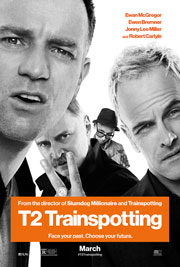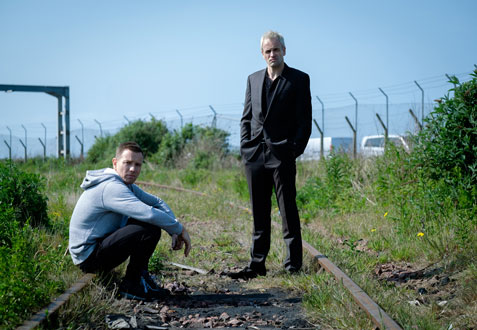Movie Review: “T2 Trainspotting”

Let’s set aside, for the moment, the fact that “T2 Trainspotting” is one of the most unnecessary sequels the world has ever seen. Instead, let’s discuss my pitch for what that sequel would look like:
Sick Boy and Begbie find Renton and spend the entire film beating him to death. Roll credits.
As it turns out, that is not far off from the reality. “T2 Trainspotting” is the culmination of a lifetime of bad decisions and the influence that they have on a person even when they know it’s time to make better ones. If “Trainspotting” was equal parts tragic and upbeat, “T2” is mostly pathetic, capped by a long-overdue dose of karma. That it still manages to be entertaining despite looking, sounding and feeling exactly like the original film is to the great credit of director Danny Boyle, with slightly less credit to screenwriter John Hodge for reasons which will soon become apparent.
Mark Renton (Ewan McGregor) returns to his childhood home of Edinburgh for the first time after stealing £16,000 from his junkie friends 20 years earlier. Life for those friends, sadly, is more of the same. His former bestie Simon “Sick Boy” Williamson (Jonny Lee Miller) is working extortion schemes with the help of pretty Bulgarian Veronika (Anjela Nedyalkova), while Daniel “Spud” Murphy (Ewen Bremner), having recently lost his job, is attempting suicide via overdose when Mark visits and subsequently saves him, much to Spud’s chagrin.
When Mark visits Simon, Simon of course beats the snot out of him, but he also has a larger con in mind in order to completely crush Mark, a game that becomes more complicated when Begbie (Robert Carlyle) devises a scheme to break out of prison, because of course he’s in prison. Upon his escape, and the realization that Mark is back in town, Begbie has two goals: kill Mark and bring his college-attending son into the family business (petty theft).
So Begbie is transferred to a hospital after suffering a grisly, self-inflicted injury, from which he escapes in the most conspicuous manner possible. He immediately goes to visit his wife and son, and stays there for what appears to be a least a few days, without a single visit from the police. Hodge is better than this. A single shot of Begbie hanging from a windowsill while the police check the house would have been enough to rectify this, but no.
There is a betrayal at the end of the film that leads to dire, life-ending circumstances for two major characters, and yet it is never acknowledged. Maybe they don’t know it’s happened yet, but it appears that they do know but don’t care. This is not okay. They’re both staring down long jail sentences. They shouldn’t be this chill about it.
There is also a scene where two characters do heroin for the first time in ages, but just once, for old time’s sake, without consequence. Because that’s how heroin works. Jesus. Hodge nails the emotional and mental tone of all concerned (or does that credit go to “Trainspotting” author Irvine Welsh?) but places them in situations that would make Bridget Jones blush. Perhaps that credit/debit goes to Welsh as well, but I honestly can’t be bothered to keep score at this point. Regardless of which of them is responsible, it doesn’t make for good storytelling.
It’s tempting to be cynical and accuse Boyle of not having any new ideas, but the recycling of songs, shadow shots and freeze frames serves a dual purpose. The sad fact of the matter is that these men have not moved on with their lives, something Veronika teases them about without them knowing it (you’ll know the moment when you see it), so contrasting who these people once were via shadow with who they are in the present makes a strong, if sad, statement. Once in a while, present-day junkie is not behaving in the same manner as twenty-something junkie (Spud, mostly), but the point has been made.
“T2 Trainspotting” is the cinematic equivalent of discovering that there is no Santa Claus. The hope that Mark Renton was on his way to a better life is gone, and it cannot be replaced. This movie isn’t just a disappointment; it’s a violation.
Related Posts
Comments Off on Movie Review: “T2 Trainspotting”
Posted in: Entertainment, Movie Reviews, Movies
Tags: comedy films, Danny Boyle, drama films, Ewan McGregor, T2 Trainspotting, Trainspotting
















